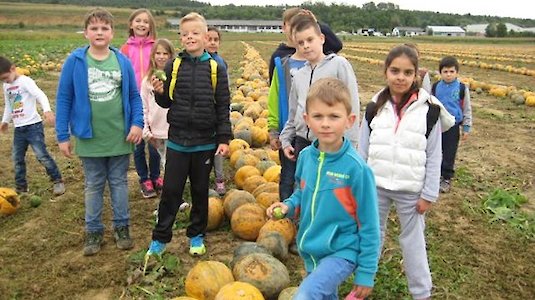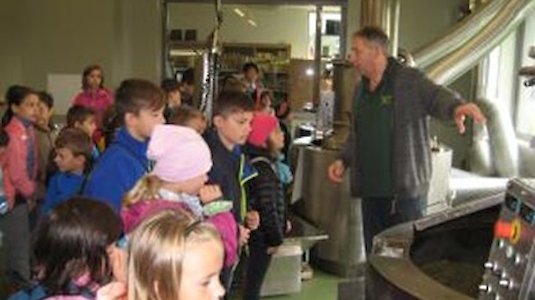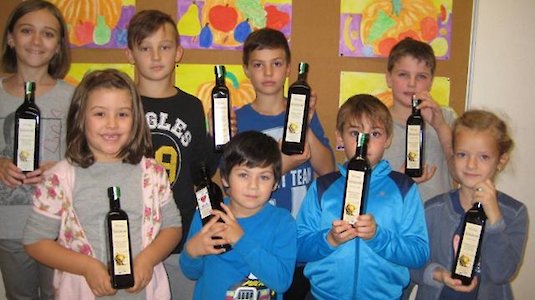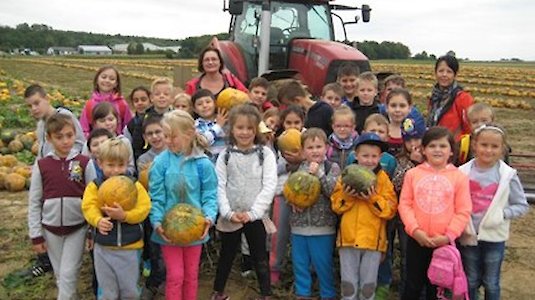VS Rotenturm: P for pumpkin
At the Rotenturm an der Pinka elementary school, everything revolved around a large, mostly yellow or orange fruit: The pumpkin! In a project, the students learned about the path from the pumpkin plant to the bottling of pumpkin seed oil.
The market town of Rotenturm an der Pinka is located in southern Burgenland. The municipality's elementary schoolhas been allowed to carry the Austrian Ecolabel since October 4, 2021 - an important distinction and motivation for the dedicated pedagogical team! In the current school year 2021/22, it will teach a total of 47 children in three classes under the leadership of Eva Bittner, the director of the elementary school. Ecological issues play an important role in the lessons. Therefore there was also the project running over two school years "From the plant to the oil", concretely: "From the pumpkin plant to the pumpkin seed oil".
He plows, he harrows, he plows and sows. The students were able to experience the entire process. First they became active at the field of the farmer Günter Dirnbeck in Rotenturm: The sowing of the grains, the care of the plants, the growth phases of the pumpkin plants could experience and witness the children by regular visits of the cultivation area.

Classroom science lessons reinforced what was observed in the field. Topics such as "From the small seed to the large fruit" and "What you can make from pumpkins" were developed with the students. The result: "We now know exactly how the pumpkin plant grows and thrives. And how the healthy oil is made from the seeds." Director Eva Bittner is pleased: "This is how science education should be: exciting, fun and hands-on!
In visual education, the children painted still lifes with fruits - the magnificent pumpkin that had already been harvested naturally formed the centre of the successful compositions. But there was even more creativity: "Immediately after the pumpkin harvest, we got to work: we carved faces into the pumpkins and painted the orange fruits.
There's even a happy feast. Pumpkins are mainly used as boiled, fried or baked vegetables. In the Rotenturm school kitchen, a pumpkin seed soup was cooked and eaten together. And in this way the children became familiar with healthy nutrition.

Finally the time had come! After the pumpkins had been harvested, an excursion to the Höfler family's oil mill in Kaindorf, Styria, took place. Of course, it was an exciting day for the pupils! Farmer Günther Dirnbeck also came along. "At the oil mill, Mr Höfler first explained the production process to us. Then we were allowed into the machine hall. There we could closely observe how the kernels were crushed, heated and pressed. When the first drops came out of the oil press, our excitement was huge."
Afterwards, pupils' parents filled the kernel oil into bottles and stuck labels "with heart" on them. Later, the "primary school kernel oil" was sold at the school's own stand at the Christmas market in Rotenturm. Part of the proceeds were used to buy "book trolleys" for the school.
And he worked his hands even earlier and even later. All in all, the children were able to experience how much work and time, thought and plant care it takes until the kernel oil can be pressed. They understood the creation of a healthy food. It is important for pupils to experience the local production of food with all their senses, to become active themselves and to be able to "eat" the results in the truest sense of the word. But they also need to know about the marketing of local products - as was done in Rotenturm.

Then the barn fills up again in autumn. But not by itself! The children in Rotenturm are now aware of this. They understand how a farmer's work in the field works, from cultivation to harvest. But they also realise that the pumpkins in the field don't look like the ones on sale in the supermarket. And they know why. And in cooking lessons, they experience that what is grown locally tastes better! Of course, these are important insights that also have an impact on the children's future. All in all, the sometimes strenuous work in the fields promotes a sense of togetherness among the pupils! This is also an important aspect of the project "From plant to oil".
